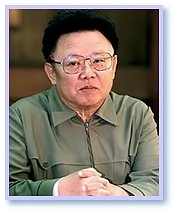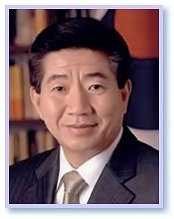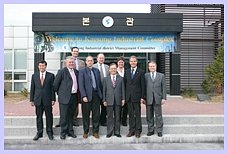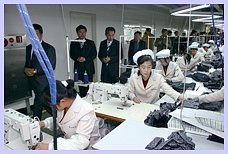 |
Reports according to Master’s order and rating

Korea
Korea’s Enlightened Policies
By Seoul News Group (Originally in Korean)
The Sunshine Policy
|
 The Sunshine Policy
is the key conciliatory policy toward North Korea that the former president
Kim Dae-Jung advocated. This policy
toward North Korea is not based on confrontation, but humanitarian
aid in order to lead North Korea to opening its door. Kim Dae-Jung sent
a herd of cows and fertilizer to the North and accomplished the historical
summit talk with his counterpart, Kim Jung-Il in 2000. It was soon followed
by the reunion of a family that had been separated since the Korean War.
In recognition of these accomplishments, Kim Dae-Jung ♥♥♥♥♥♥♥
won the Nobel Peace Prize.
The Sunshine Policy
is the key conciliatory policy toward North Korea that the former president
Kim Dae-Jung advocated. This policy
toward North Korea is not based on confrontation, but humanitarian
aid in order to lead North Korea to opening its door. Kim Dae-Jung sent
a herd of cows and fertilizer to the North and accomplished the historical
summit talk with his counterpart, Kim Jung-Il in 2000. It was soon followed
by the reunion of a family that had been separated since the Korean War.
In recognition of these accomplishments, Kim Dae-Jung ♥♥♥♥♥♥♥
won the Nobel Peace Prize.
 The current president, Roh Mooh-Hun ♥♥♥♥♥♥♥,
also supports the Sunshine Policy and continues to supply food and fertilizer
for the North to help the North Korean people. Through these
efforts, the Sunshine Policy somehow influenced the North Korean administration
in initiating two inter-Korean projects: Kaesong Industrial Complex and
Mt. Kumgang tourism. Invested by South Korean businesses, an industrial
complex was established in Kaesong, North Korea, which is located near
the 38 line, a military line that separates the North and the South. People
from the South also began sightseeing at Mt. Kumgang, the North’s
famous tourist attraction.
The current president, Roh Mooh-Hun ♥♥♥♥♥♥♥,
also supports the Sunshine Policy and continues to supply food and fertilizer
for the North to help the North Korean people. Through these
efforts, the Sunshine Policy somehow influenced the North Korean administration
in initiating two inter-Korean projects: Kaesong Industrial Complex and
Mt. Kumgang tourism. Invested by South Korean businesses, an industrial
complex was established in Kaesong, North Korea, which is located near
the 38 line, a military line that separates the North and the South. People
from the South also began sightseeing at Mt. Kumgang, the North’s
famous tourist attraction.
 |
 |
The members of EU |
South Korean investors
|
However, the Sunshine Policy faced a difficult phase internally and externally after North Korea carried out the nuclear test last October. The conservative political groups in South Korea called for a stop to the policy; an international society also intended to take sanctions against the North through a UN resolution. If these economic sanctions are taken, North Korea would go through another harsh plight just like in the mid ‘90s when numerous people died from hunger. The crops produced per year in the North are about 4 million tons while at least 6 million tons are needed to avoid famine.
In spite of the strong objection of the opposition parties, the Roh Moo-Hyun administration announced the government would not compromise the basic principles of the Sunshine Policy. It would maintain the Mt. Kumgang tourism and Kaesong Industrial Complex, calling the two inter-Korean business projects “symbols of peace on the Korean Peninsula.” Roh once said in a TV interview, “Some argue that we should not shy away from going to war. It is truly irresponsible and dangerous. War on the Korean Peninsula would bring about a disaster of collective destruction for all Korean people, where neither a winner nor a loser exists.”
Furthermore, the newly appointed unification minister said that the humanitarian aid for North Korea should be continued even if the North carries out a second nuclear test. All these positive remarks must have sent a good message to the North. The country recently decided to return to the six-way talks where peace and de-nuclearization would be discussed. In fact, now is when the Sunshine Policy is needed most.
Home Care Insurance for the Aged
This new home care system, which will be implemented in July 2008, is a service aiming to stabilize the life of incapable or ill elderly people and diminish their family burdens. Special care-givers are trained to visit the elderly homes to provide services such as bathing, helping with bodily functions, changing clothes, cleaning, purchasing necessities, and cooking. For those who are ill, the nurses accompany care-givers to assist in treatment and counseling. Those with no family members can be admitted to the designated care centers. The budget for the service is mainly subsidized by the government.
The Free Provision of HIV/AIDS Medications
The people with HIV/AIDS in Korea receive free HIV/AIDS Medications provided by both local and central governments. Since the effective anti-AIDS therapy, called the cocktail therapy (the combination of three different AIDS medicines), was introduced to Korea in 1997, those infected do not seclude themselves but constantly keep in touch with public health centers to receive proper help. This helps prevent the viruses from spreading. The HIV/AIDS rate in Korea is less than 0.1 % - with only 4,277 reported cases as of June, Golden Year 3 (2006).
The Anti-Prostitution Law
The Korean government has enacted the
anti-prostitution law in September, Golden Year 1 (2004). It aims not
only at decreasing the sex industry but more importantly at raising awareness
that buying sex is a crime or at least a shameful act. Along with the
implementation of the law, many woman-related NGOs (non governmental organizations)
also spearheaded a public education campaign that asserts that paid sex
is violent behavior which abuses women’s human rights and harms
their health. Since the law went into effect, the number of brothels and
prostitutes has decreased greatly over the past years. Rehabilitation
programs for prostitutes were also designed. Some clustered red-light
areas almost went out of business, and subsequently human rights abuses
at those red light areas have been eliminated even though prostitution
still takes place in scattered areas. Nevertheless, the law has already
brought positive influence on the public.![]()
| << | Contents | >> |
|
Refer this page to friends
|
||